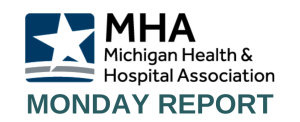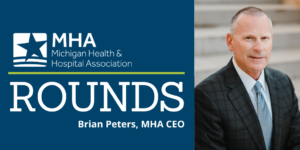
MHA Partners with AAPL for CME Courses
The MHA is pleased to partner with the American Association for Physician Leadership (AAPL) to provide a series of in-person Continuing Medical Education (CME) courses in 2024 at the MHA headquarters at 2112 University Park Drive, Okemos, MI …
The Joint Commission Revises Definition of Suicide in Sentinel Event Policy
The Joint Commission has updated the definition of suicide in its Sentinel Event Policy to include time frames with the highest risk for suicide and highlight the healthcare organization’s continued responsibility for ongoing assessment …
MDHHS Expands Medicaid Coverage to Include CHW Services and Releases Beginner Guide
The Michigan Department of Health and Human Services (MDHHS) recently announced an expansion of Medicaid coverage effective Jan. 1, 2024 to include community health worker (CHW) services. The MDHHS also issued a final policy establishing this coverage for Medicaid …
Nominations Open for Hometown Health Heroes Award
The MHA is pleased to sponsor Michigan Public Health Week, scheduled for April 10, 2024, with the theme of “Protecting, Connecting and Thriving: We Are All Public Health.” MHA members are encouraged to submit nominations …
 MHA CEO Report — Vaccinations & Respiratory Illness Season
MHA CEO Report — Vaccinations & Respiratory Illness Season
The last four years have generated tremendous awareness about vaccines, but also a large public health challenge as disinformation has exploded and anti-vaccine sentiment has emerged from the fringes to become widely embraced. This likely isn’t news to any of you, but the …
The Keckley Report
 An Open Letter to Hospital Boards of Directors: Long-Term Strategic Planning needs Your Attention
An Open Letter to Hospital Boards of Directors: Long-Term Strategic Planning needs Your Attention
As 2023 comes to an end and prognostics for 2024 pepper Inboxes, high anxiety is understandable. The near-term environment for hospitals, especially public hospitals and not-for-profit health systems, is tepid at best: despite the November uptick in operating margins to 2% (Fitch, Syntellis), the future for hospitals is uncertain and it’s due to more than payer reimbursement, labor costs and regulatory changes. …
Hospitals are not alone in dealing with money-driven pressures that seem out of sync with lofty aims like ‘student athletes’ and ‘community benefits.’ That’s why hospitals must embrace long-term strategic planning with an outside-in frame of reference now.”
 MHA in the News
MHA in the News
The MHA received media coverage over the holidays during the weeks of Dec. 18, Dec. 25 and Dec. 31. Topics covered include the healthcare workforce, the MHA Keystone Center, air ambulance services and a review …

 MHA CEO Report — Vaccinations & Respiratory Illness Season
MHA CEO Report — Vaccinations & Respiratory Illness Season MHA in the News
MHA in the News
